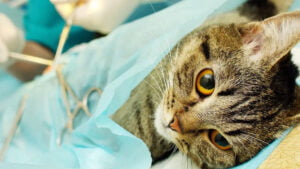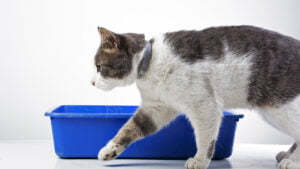After a neutering procedure for your cat, be careful of any indications of infection. It is rare for cats to contract infections post-surgery, however, the risks exist. Most of the time, infections are minor and treatable with little difficulty. This blog post will discuss the signs of infection after neutering a cat and how to treat them.
What is an infection in a cat?
An infection in a cat is any condition that causes the animal’s body to be invaded by bacteria, viruses, fungi, or other organisms. These invaders can make the cat sick and, in some cases, even kill it. Infections can affect any part of the cat’s body, including the skin, eyes, ears, nose, mouth, lungs, and gastrointestinal tract. Some of the more common types of infections seen in cats include upper respiratory infections, skin infections, and ear infections. Infections are usually treated with antibiotics or other medications, although some may require hospitalization and more intensive care. Prevention is the best medicine, so it’s important to keep your cat up-to-date on its vaccinations and to take steps to reduce its exposure to potential sources of infection, such as other sick animals.

What are the signs of infection after neutering a cat?
If your cat has been neutered and it has begun to show signs of infection, it is important to take them immediately to the vet. Some signs of infection after neutering a cat include:
- Fever
- Swelling or redness at the incision site
- Excessive licking or scratching at the incision site
- Lethargy or lack of appetite
- Vomiting or diarrhea
If you notice any of these signs, please take your cat to the vet as soon as possible. Early intervention and precaution is the key to preventing more serious infections.
Swelling or redness at the incision site
If you notice that your cat’s incision site is swelling or having redness, this could be a sign of infection. You should take it to the vet right away to have it checked out. Excessive licking or scratching at the incision site can also lead to infection, so it’s important to keep an eye on your cat and make sure they’re not doing this too much.
Lethargy or lack of appetite
One of the many signs of infection after neutering a cat is if your cat is acting lethargic or doesn’t seem to be interested in food. If they’re not eating, this can lead to dehydration, which can make the infection worse. Make sure to keep an eye on your cat’s water intake and see if they’re drinking more than usual. If you notice any of these signs, please take your cat to the vet as soon as possible. Early intervention is key to preventing more serious infections.

Vomiting or diarrhea
If your cat is vomiting or has diarrhea, this could be a sign of infection. Dehydration can also occur with these symptoms, so it’s important to make sure your cat is drinking enough water. If you notice any of these signs, please take your cat to the vet as soon as possible. Early intervention is key to preventing more serious infections.
Fever
If your cat has a fever, this is a sign that its body is fighting off an infection. It’s important to take them to the vet so they can be treated and the fever can be brought down. Dehydration can also occur with a fever, so make sure to give your cat plenty of water to drink. If you notice any of these signs of infection after neutering a cat, please take your cat to the vet as soon as possible. Early intervention is key to preventing more serious infections.
Excessive licking or scratching at the incision site
If your cat is excessively licking or scratching at its incision site, it could be a sign of infection. While it’s normal for cats to lick their wounds, if they’re doing it excessively, it could lead to further irritation and even infection.
Licking and scratching can also cause the incision to open up, which can lead to even more serious problems. If you notice your cat’s incision is open or bleeding, take them to the vet immediately
Refusing to eat
If your cat stops eating, this can put them at risk for dehydration and malnutrition. It’s important to take them to the vet so they can be treated and the fever can be brought down. Dehydration can also occur with a fever, so make sure to give your cat plenty of water to drink. If you notice any of these signs, please take your cat to the vet as soon as possible. Early intervention is key to preventing more serious infections.
Discharge from the incision site (pus or blood)
If you notice any discharge from your cat’s incision site, this could be a sign of infection. Discharge can range in color from clear to yellow or green, and can be either pus-like or blood-tinged. If you notice any discharge, please take your cat to the vet as soon as possible. Early intervention is key to preventing more serious infections.

Swelling around the incision site
Swelling around your cat’s incision site is one of the many signs of infection after neutering a cat. It can range in size from a small bump to a large, painful mass. If there is any swelling, please take your cat to the vet as soon as possible. Early intervention is key to preventing more serious infections.
How do you know if your cat has an infection after surgery?
If your cat shows signs like these, it may have an infection and you should take him to the vet right away:
- Fever
- Swelling or redness at the incision site
- Drainage or pus coming from the incision
- Increased pain at the incision site
- lethargy or poor appetite
If your cat has an infection, it’s important to get her treated right away. Left untreated, an infection can cause sepsis, which is a life-threatening condition. So if your cat has any of the above signs, don’t wait to take him to the vet.

What should you do if you think there are signs of infection after neutering a cat?
If you think your cat has an infection after neutering surgery, the first thing you should do is take it to the vet. Left untreated, an infection can cause sepsis, which is a life-threatening condition. Treatment for an infection may include antibiotics, pain medication, and/or drains. It’s important to follow your vet’s instructions for treatment to ensure that the infection is properly treated.
At the vet, they will likely do a physical examination and may also take x-rays or perform blood tests. If they think your cat has an infection, they will likely prescribe antibiotics. They may also clean the incision site and recommend a course of action for at-home care.
So the steps are:
- Take it to the vet
- Physical examination
- The vet may also take x-rays
- Perform blood tests
- Clean the incision site
- Follow the course of prescribed antibiotics
- Take good care of it’s diet at home
How is an infection treated after neutering surgery in cats?
Only a vet can properly diagnose and treat an infection. So don’t wait to see if the signs go away on their own, as this could put your cat’s life at risk. Only a vet can properly diagnose and treat an infection. So don’t wait to see if the signs go away on their own, as this could put your cat’s life at risk. A vet will likely perform some of the following mentioned procedures:
- Physical examination
- X-rays
- Blood tests
- Clean the incision site
- Prescribing antibiotic course
Cats with retained testicles
If one or both of your cat’s testicles have not descended into the scrotum, this is called cryptorchidism. It’s a relatively common condition, affecting around three percent of cats. Cryptorchidism can be caused by various factors, including genetics, trauma, or disease.
If your cat has cryptorchidism, it’s important to have him neutered as soon as possible. While Cryptorchidism itself is not a life-threatening condition, it can lead to other health problems down the road. For example, retained testicles are more likely to develop tumors. They’re also more likely to become infected, which can lead to sepsis, a potentially life-threatening condition.
So, if you have a cat with cryptorchidism, be sure to have him neutered as soon as possible. This will help to prevent any future health problems.
How long does my cat have to wear a cone after neutering?
After your cat is neutered, she will need to wear a cone (also called an Elizabethan collar) for about two weeks. This is to prevent him from licking or scratching at the incision site. It’s important to keep the area clean and dry during this time.
You should also keep an eye out for any signs of infection, such as redness, swelling, or discharge. If you notice any of these signs, be sure to take your cat to the vet right away. Once the two-week mark has passed, you can slowly start to introduce your cat to normal activity. But be sure to take things slowly at first. And if you have any concerns, be sure to talk to your vet.
So, in short, your cat will need to wear a cone for about two weeks after being neutered.
Do male cats spray after being neutered?
No, male cats do not spray after being neutered. In fact, neutering is the most effective way to stop a male cat from spraying. Spraying is a territorial behavior. Male cats spray to mark their territory and to let other cats know that they are around. When a male cat is neutered, he no longer feels the need to mark his territory.
So, if you have a male cat that is spraying, the best thing you can do is have him neutered. This will stop the spraying behavior and help to keep your home clean.

Can cats use the litter box after being neutered?
Yes, cats can use the litter box after being neutered. In fact, most cats will start using the litter box within a day or two of surgery.
However, there are a few things you need to keep in mind.
- First, your cat may not be able to urinate as much as usual right after surgery. This is because the surgical incision can make it painful to urinate.
- Second, you need to give your cat time to heal. This means keeping him indoors for at least two weeks after surgery. During this time, you should provide him with a quiet place to rest and a litter box.
- After the two-week mark, you can start to slowly introduce your cat to normal activity. But be sure to take things slowly at first. And if you have any concerns, be sure to talk to your vet.
Are there any long-term effects of infection after neutering a cat?
While the risk of infection is relatively low, it’s important to be aware of the signs and symptoms. These can include redness, swelling, discharge, and fever. If you notice any of these signs, it’s important to take your cat to the vet right away.
In most cases, the infection can be treated with antibiotics. However, in some cases, it may lead to more serious complications. These can include sepsis, a potentially life-threatening condition.
So, while the risk of infection is relatively low, it’s important to be aware of the signs and symptoms.
Can cats pee normally after being neutered?
Yes, cats can pee normally after being neutered. In fact, most cats will start using the litter box within a day or two of surgery. However, there are a few things you need to keep in mind.
- First, your cat may not be able to urinate as much as usual right after 24 hours of the surgery. This is because the surgical incision can make it painful to urinate.
- Second, you need to give your cat time to heal. This means keeping him indoors for at least two weeks after surgery and providing him with a quiet place to rest and a litter box.
What if my cat is constipated after neuter surgery?
If your cat is constipated after neuter surgery, there are a few things you can do. First, make sure she is drinking plenty of water. You can also give her a small amount of canned pumpkin (not the pie filling) or bran cereal to help move things along. If she is still constipated after a day or two, contact your veterinarian. He may recommend a stool softener or laxative. In rare cases, surgery may be necessary to remove an obstruction.
If you see any signs of infection (redness, swelling, discharge), contact your veterinarian immediately. Infection is a serious complication of any surgery and can be life-threatening.
Keep an eye on your cat’s incision site. It should be clean and dry, and the skin should not be red or swollen. If you see any signs of infection, contact your veterinarian immediately.
Finally, make sure your cat is getting plenty of rest. Surgery is a big deal, and she needs time to recover. Keep her indoors and let her take it easy for a week or two. Then she can go back to being the active, playful kitty you know and love.
Reasons for a lump at the surgery site
If you notice a lump at the surgery site, don’t panic. It’s actually quite common and is usually nothing to worry about. The lump is usually caused by fluid buildup under the skin (seroma). This can happen when the body tries to heal itself by producing extra fluid. The lump should go away on its own within a few weeks.
If the lump is large or doesn’t seem to be going away, contact your veterinarian. He may recommend draining the fluid with a needle (aspiration). In rare cases, surgery may be necessary to remove the seroma.
Infection is another possible cause of a lump at the surgery site. This is a serious complication that requires immediate medical attention. Signs of infection include redness, swelling, and discharge from the incision site. If you see any of these signs, contact your veterinarian immediately.
Complications of infected cat spay incisions
The most common complication of an infected spay incision is abscess formation. An abscess is a pocket of pus that forms when the infection spreads through the body. Infected abscesses can be very painful and may require surgery to drain.
Other signs of infection after neutering a cat include fever, lethargy, and loss of appetite. If you notice any of these signs, contact your veterinarian immediately. Infection is a serious complication that can be life-threatening.
Preventing infection after surgery
The best way to prevent infection is to have your cat spayed by a qualified veterinarian. The vet will clean and disinfect the incision site before surgery. He may also give your cat antibiotics to help prevent infection.
After surgery, it’s important to keep the incision site clean and dry. You should also watch for signs of infection, such as redness, swelling, and discharge. If you see any signs of infection after neutering a cat, contact your veterinarian immediately.
Finally, make sure your cat is getting plenty of rest.
How to promote healing after the neutering surgery of a cat?
After your cat has undergone neutering surgery, it is important to take steps to ensure proper healing. First and foremost, keep the incision site clean and dry. You should also watch for signs of infection, such as redness, swelling, and discharge. If you see any of these signs, contact your veterinarian immediately.
It is also important to make sure your cat is getting plenty of rest. Your cat needs time to recover so give her plenty of time and comfortable space. Keep her indoors and let her take it easy for a week or two. Then she can go back to being the active, playful kitty you know and love.
By following these simple tips, you can help your cat heal quickly and safely after surgery.
Can cats be neutered if they have an infection?
No, cats cannot be neutered if they have an infection. This is because the surgery requires the use of general anesthesia. And when a cat is under general anesthesia, there is a risk that the infection could spread. For this reason, it is important to make sure your cat is healthy before surgery. If your cat does have an infection, you will need to treat the infection first before scheduling the surgery.
When should you call your vet if your cat shows signs of infection after neutering surgery?
If you notice any signs of infection in your cat after surgery, such as fever, lethargy, or loss of appetite, you should call your vet immediately. Infection is a serious complication that can be life-threatening. It would help if you also watched for signs of infection at the incision site, such as redness, swelling, or discharge. If you see any of these signs, contact your veterinarian immediately. Taking prompt action can help prevent the infection from spreading and allow your cat to heal quickly.
Conclusion
If you notice any signs of infection in your cat after surgery, such as fever, lethargy, or loss of appetite, you should call your vet immediately. Infection is a severe complication that can be life-threatening. It would be best if you also watched for signs of infection at the incision site, such as redness, swelling, or discharge. If you see any of these signs, contact your veterinarian immediately. Taking prompt action can help prevent the infection from spreading and allow your cat to heal quickly. Thanks for reading! signs of infection after neutering a cat.
FAQs:
Q: Can cats be neutered if they have an infection?
A: No, cats cannot be neutered if they have an infection. This is because the surgery requires the use of general anesthesia. And when a cat is under general anesthesia, there is a risk that the infection could spread. For this reason, it is important to make sure your cat is healthy before surgery. If your cat does have an infection, you will need to treat the infection first before scheduling the surgery.
Q: When should you call your vet if your cat shows signs of infection after neutering surgery?
A: If you notice any signs of infection in your cat after surgery, such as fever, lethargy, or loss of appetite, you should call your vet immediately. Infection is a serious complication that can be life-threatening. You should also watch for signs of infection at the incision site, such as redness, swelling, or discharge. If you see any of these signs, contact your veterinarian immediately.
Q: What can I do to help my cat heal quickly and safely after neutering surgery?
A: Following a few simple steps can help your cat heal quickly and safely after neutering surgery. Make sure you keep the incision site clean and dry, as well as monitor for signs of infection. It is also important to keep your cat quiet and stress-free while they are healing. This means limiting their activity, playing with them gently instead of roughhousing, and if necessary, keeping them indoors. Finally, be sure to give your cat plenty of rest by providing a comfortable place for her to sleep and relax.
Q: What should I do if my cat shows signs of infection after neutering surgery?
A: If you notice any signs of infection in your cat after surgery, such as fever, lethargy, or loss of appetite, you should call your vet immediately. Infection is a serious complication that can be life-threatening. You should also watch for signs of infection at the incision site, such as redness, swelling, or discharge. If you see any of these signs, contact your veterinarian immediately. Taking prompt action can help prevent the infection from spreading and allow your cat to heal quickly.
Q: What can I do to prevent infection after neutering surgery?
A: The best way to prevent infection after neutering surgery is to keep the incision site clean and dry, limit activity, and provide a comfortable place for your cat to sleep and relax. It is also important to monitor for signs of infection, such as fever, lethargy, or loss of appetite. It is important to make sure your cat is healthy before surgery by taking them for a pre-operative exam so that any existing infections can be treated beforehand.
Read more:


Leave a Reply